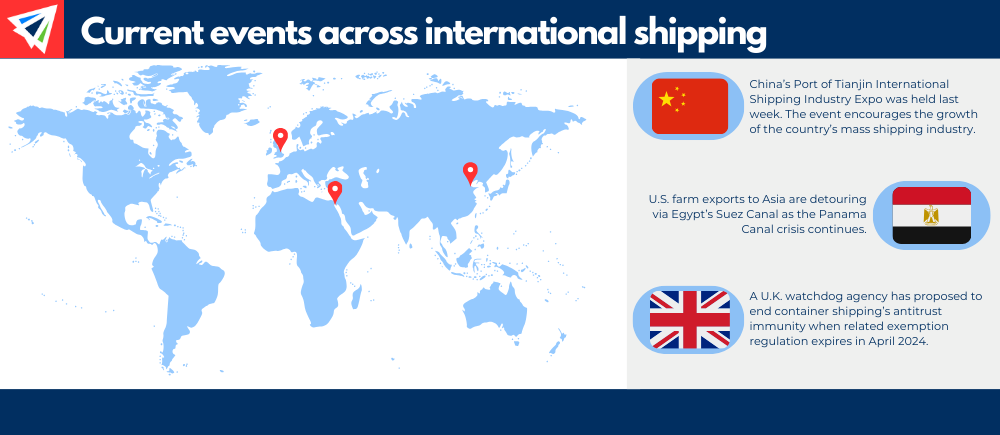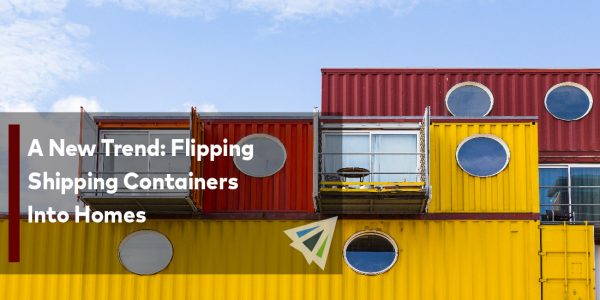Competitive Edge
November 22nd, 2023
Stay Current with InterlogUSA
Latest Industry Happenings and Market Updates:

IMPORT: Asia to North America (TPEB)
Recent Developments:
- Severe draft restrictions at the Panama Canal are expected to continue into February 2024. This includes reducing the number of vessels transiting the canal each day to just 18 by then. In normal (non-drought) conditions, around 35 ships a day are permitted through the Panama Canal.
Rates: Rates have slid this past week after a series of gradually rising earlier in the month.
Space: Space is generally open, but certain services have seen tightening.
Capacity: Blank sailings are expected to continue into Chinese New Year as carriers remain managing their overcapacity.
Equipment: A shortage in railcar availability has impacted freight movement at West Coast ports. This issue is largely due to an imbalance in westbound and eastbound traffic.
TIPS:
- Hold your logistics partners accountable for frequent updates regarding blank sailings, rate increases, or any other forms of carrier maintenance.
- Establish a firm timeline for future import activity.
IMPORT: Europe to North America (TAWB)
Recent Developments:
- Carbon-related surcharges have been announced by ocean carriers ahead of the shipping industry’s indoctrination to the EU emissions trading system in January. For more information.
Rates: Rates saw a jolt mid-November, however, are gradually falling again as demand remains too low to prop up increases.
Space: Space is open.
Capacity: Capacity is plentiful with no major adjustments from carriers yet.
Equipment: Availability on both origin and destination sides, unless advised otherwise.
TIPS:
- Book at least three weeks prior to the ready date.
- Carriers have yet to take aggressive action, like they have in the Pacific, regarding capacity management. However, this trade is not profitable for them in its current state, so be on the lookout as they may become more emboldened.
EXPORT: North America to Asia
Recent Developments: The Panama Canal’s deteriorated conditions has led to a routing shift for U.S. farm exports via the Suez Canal.
Rates: After sliding through October, outbound rates have levelled off—remaining relatively low. However, for exports rerouted through the Suez Canal, rates are notably higher than traditional Panama Canal routing.
Capacity: Schedule reliability can be fickle in pockets.
Equipment: A tricky import market has spurred on rail car availability issues.
TIPS:
- Insufficient communication with sailing schedules can lead to higher detention and demurrage fees as well as higher trucking and storage costs. Ensure your logistics partners are not keeping you and your cargo in the dark.
Watch Last Week's Webinar!
FEATURING: Special Guest, Andre Winters – Interlog’s Director of Branch Development
TOPICS: Our experts talk extensively about the Panama Canal: latest updates, impact the issues/challenges the canal’s having on shippers/carriers, potential rerouting options, and more.
Sign Up For Our December Webinar!
Our next webinar is Wednesday, December 20th, at 10am CST!
One topic we will be discussing is the upcoming Chinese New Year. Other topics will be announced in the coming weeks.
If you have any topic suggestions or questions for our experts..
please reach out to us at [email protected]
What is Coffee & Cargo? Every month, our experts sit down to discuss what’s currently happening in the shipping industry. Every so often we are joined by special guests, who share their specific expertise and experiences.
Freight News
October U.S. Imports from Asia See Their Highest Levels for the Year
For the month of October, U.S. imports from Asia totaled 1.57 million TEUs, the highest for this year so far. Retailers continued to get their merchandise into the U.S. and in their stores before the upcoming holiday rush.
Containerized imports were up 5.9% from September and increased 12.4% from October last year.
But year-to-date imports are still down over 15% through the first ten months of this year.
Congress Steps In Conversation Regarding Jurisdiction of Rail Fees for Ocean Containers
Some clarity made be headed U.S. shippers way in regards to which government agency (Federal Maritime Commission or the Surface Transportation Board) should have the oversight of which storage fees railroads charge for ocean containers, the JOC reports.
A Representative from California and a member of the House’s Transportation and Infrastructure Committee, John Garamendi, is putting together legislation that would “compel” the FMC and STB to create a memorandum over which agency has authority.
In Garamendi’s proposed legislation, it would also look to codify that rail demurrage fees be billed to the ocean carrier, which would then be passed along to the shipper or BCO responsible for the charge.
A Podcast by InterlogUSA: NEW FreightFM Episode
Check out episode 13: “Tis the Season: Holiday Trucking and Consumer Spending!”
Interlog’s Emily Smith, Harry Lien and Owen Campbell sit down and discuss consumer spending and trucking conditions ahead of the uncertain holiday season!
FreightFM features short-form video interviews with Interlog’s industry experts offering insights into breaking news, market trends, our company’s history, and more!
Vote for Your Favorite Thanksgiving Dish
Choose between the popular favorites of:
Turkey, Pumpkin Pie, Cranberries, or
Mashed Potatoes
Interlog  Insights
Insights
In last week’s insights, we discussed how agriculture exports seek solace via Suez Canal routing.
Plus, what are consumers are spending on this holiday season?
Sign up for our
industry answers
Our team works to provide valuable, unique, and relevant content to assist you in finding solutions. Sign up now.



